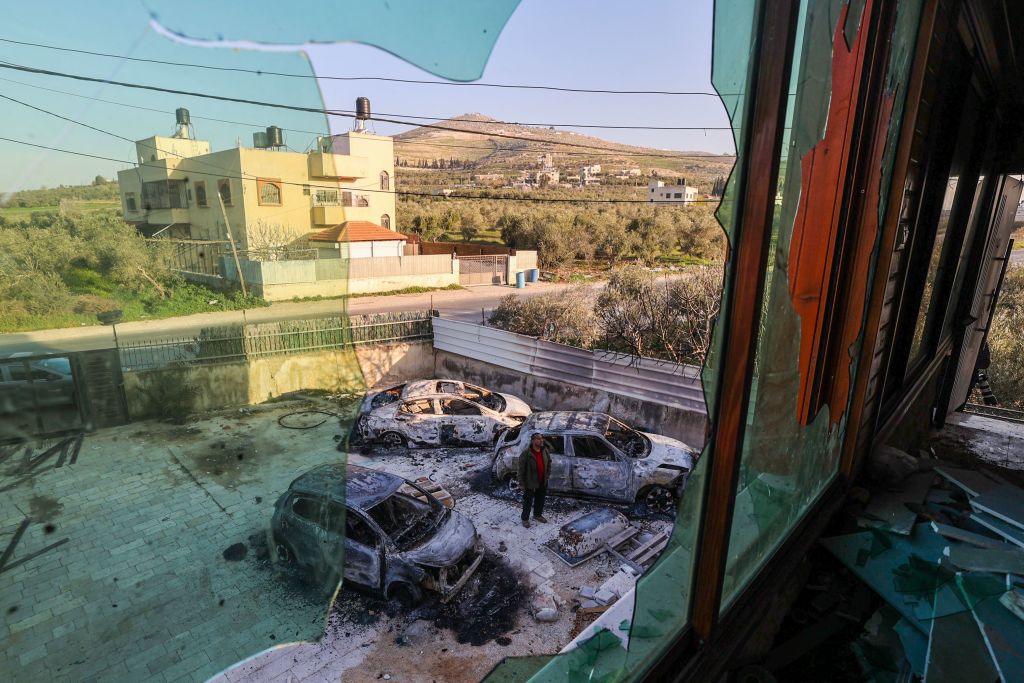
2022 was the deadliest year in decades for Palestinians living under Israeli military occupation, in which some 146 people were killed by Israeli forces. This year is on track to be even deadlier. In January and February, at least 60 Palestinians were killed by Israeli forces or settlers in the occupied West Bank, according to the Israeli human rights organization B’Tselem. (At least 14 Israelis have been killed this year following attacks from Palestinians.) The latest death, on Thursday night, was of a 15-year-old Palestinian boy in the West Bank town of Azzun. The Israeli military alleges he was throwing fireworks at Israeli motorists; the Palestinian health ministry says he was shot in the back.
Analysts warn that the situation is a tinderbox—more so after this week’s deadly and destructive rampage on the town of Huwara in the West Bank, where Israeli settlers torched dozens of Palestinian homes and cars, in response to the killing of two Israelis on Feb. 26. An Israeli general, as well as observers within and beyond the country, have since described it as a pogrom. The kind of violence seen in Huwara “is becoming more normalized,” says Sally Abed, a Palestinian citizen of Israel and member of the national leadership at Standing Together, one of the largest Arab-Jewish grassroots movements in Israel who was among those blocked from visiting Huwara. Earlier this week, Israeli finance minister Bezalel Smotrich said that he believes Huwara should be “wiped out” not by settlers, but by the state.
While settlements—which are illegal under international law—have continued to expand under successive Israeli governments, it wasn’t until the formation of its latest government under Prime Minister Benjamin Netanyahu in December that Israeli settlers have received such explicit backing from the state. That is because this government, the most right-wing the country has ever known, is made up of some of the biggest proponents of Israeli settlement expansion in, and eventual annexation of, the West Bank.
Israel’s current government includes Smotrich, himself an Israeli settler, and Itamar Ben-Gvir, the national security minister whose political background had excluded him from Israel’s mandatory military conscription (Ben-Gvir was once an active member of Kach, a since-outlawed extremist and anti-Arab party). While Ben-Gvir oversees the country’s policing, Smotrich was recently granted administrative authority over the West Bank—a move that the Israeli human rights lawyer Michael Sfard and others say is tantamount to de jure annexation, as it effectively transfers the control of occupied territory from Israeli military to civilian control. An editorial in Haaretz, Israel’s liberal newspaper of record, decried the decision for establishing “a formal, full-fledged apartheid regime.”
Experts and activists tell TIME that this political context is inextricably linked to the surge in deadly violence within Israel and the Palestinian territories. As Israel has ramped up the number of deadly military raids on Palestinian towns, the number of Palestinian attacks on Israelis has also risen. Meanwhile, settler violence against Palestinians continues to rise apace, with B’Tselem recording dozens of incidents in January alone. Dror Sadot, a spokesperson for the organization, says that the Israeli military rarely interferes in these attacks, as was the case in Huwara; in some cases, the military has aided the settlers in their attacks.
Read More: Settler Attacks in the West Bank Are On the Rise. Israel’s New Leaders May Make it Worse
The government’s relative inaction on settler violence reinforces the notion that “settler violence is state violence,” says Sadot. “They are part of a policy that is well-funded and well-backed by the state. This policy is meant to take over Palestinian land and where the government can’t do this by ‘official’ means, they do it by less official means, which is to back the settler violence.”
Under Netanyahu, Israeli ministers are now doing so explicitly, sending the message to Israeli settlers that they can continue to act with the state’s blessing. “They are completely emboldened by this government,” says Mairav Zonszein, an Israel-based senior analyst at the International Crisis Group. “They have the legitimacy that they didn’t have before politically and that gives settlers a lot more audacity.”
Absent a strong response from the Israeli government or its international allies, experts add that the violence is only bound to get worse. While Smotrich’s comments about Huwara were roundly criticized by the U.S. and others, international attention has largely focused, they say, on Netanyahu’s proposed judicial reforms that are set to weaken checks and balances on the government.
“The arsonists are running the fire station,” says Yousef Munayyer, a nonresident fellow at the Arab Center in Washington, D.C. and an expert on Israeli and Palestinian affairs. “We seem to be on the edge of something; it wouldn’t take much to push the situation over that edge.”
More Must-Reads From TIME
- The 100 Most Influential People of 2024
- The Revolution of Yulia Navalnaya
- 6 Compliments That Land Every Time
- What's the Deal With the Bitcoin Halving?
- If You're Dating Right Now , You're Brave: Column
- The AI That Could Heal a Divided Internet
- Fallout Is a Brilliant Model for the Future of Video Game Adaptations
- Want Weekly Recs on What to Watch, Read, and More? Sign Up for Worth Your Time
Write to Yasmeen Serhan at yasmeen.serhan@time.com